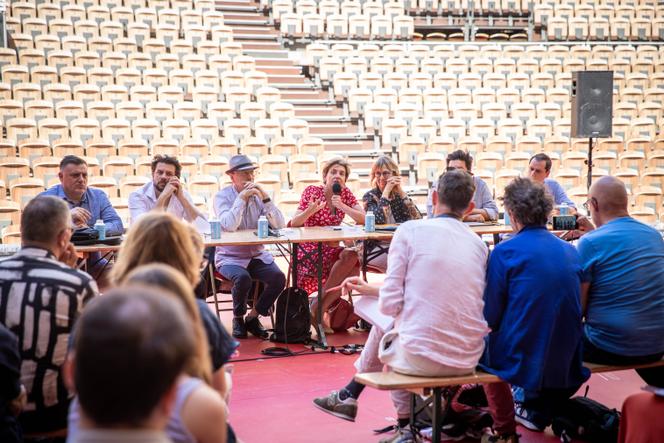
France’s summer festivals, which had already been subjected to the constraints of the Olympic calendar for some, have found themselves overtaken by another event: the legislative elections and the new political order that will emerge from the ballot box on July 7, the day of the second round. The dissolution of the Assemblée Nationale, which was decided by Emmanuel Macron the night of the European elections and the far right’s sweeping victory, and the prospect of a future government led by the Rassemblement National (RN) are blowing a wind of concern over many cultural events.
Through its long history dating back to the French Resistance, marked by struggles and demands, the Festival d’Avignon has had a front-row seat to changing times. In this context, its Portuguese director, Tiago Rodrigues, hopes for a “popular, progressive, ecological, feminist and anti-racist festival.” Numerous speeches, meetings and trade union and artistic demonstrations are scheduled to take place in the city until July 8. And then what? At the time of writing, it’s still a matter of political fiction, but there’s no doubt that a victory for the RN would cause major upheavals in a world of culture that is mostly hostile to it, and that has continually increased the number of forums and petitions calling for it to be blocked.
Peace and unity
Les Rencontres de la Photographie d’Arles, the Festival International d’Art Lyrique d’Aix-en-Provence and the Festival d’Avignon have always been in tune with the upheavals of the world. This year is no exception. In Aix-en-Provence, for example, the Orchestre des Jeunes de la Méditerranée is celebrating its 40th anniversary and continuing to defend the values of peace and unity. Its deputy director, Pauline Chaigne, explained that this is a challenge in a geographical area where it is “more difficult to recruit young artists who can express themselves freely, who feel safe enough to do so.”
In Arles, Spanish-Belgian photographer Cristina de Middel is delivering an account of the migration of Mexicans to the US, both raw and mythological. It offers a way of changing how we look at these women and men who attempt the impossible to change their lives. In Avignon, the strong South American presence is also part of this desire to confront reality with strong works, marked by postcolonial questions and issues of identity and history for these artists from countries that have experienced dictatorship.
As places for meeting, mingling, questioning and communion around art and universal values, the three major festivals in the South of France are in for a very special season. This year, more than any other, the chronicle of the festivals will be fueled by the political news of the moment. On stage and in the streets, artists and audiences alike will be talking about theater, music and photography, but also government, elections and prime ministers. And, of course, the future.